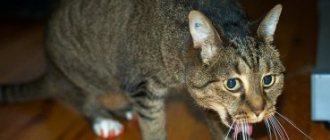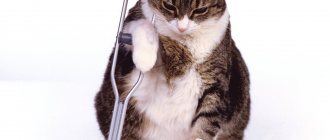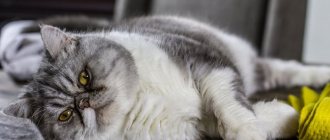3
110785
The appearance of an animal in the house is certainly a joy. Communication with cats brings positive emotions to both children and adults. But sometimes unpleasant moments happen when a cat shits on the bed, and then it’s worth knowing what to do to avoid the reappearance of puddles and marks. This article is about this.
Possible reasons for leaving puddles in the wrong place
Most reasons can be dealt with on your own. Veterinarian intervention will be required only if there is a disease of the urinary system.
Problems with the tray
Most often, a sudden riot is explained by problems with the tray. A mustachioed pet may not like:
- Location.
A constantly wide open door and extraneous noise are not the best conditions for relaxation. In addition to an unsuccessfully selected location, the reason may be its sudden change after repair. The greatest damage to the cat's psyche is caused by combining a bath and a toilet, which threatens to accidentally get wet during a crucial moment.
- Design.
Too high sides or insufficient area of the product can cause dissatisfaction with the mustache. The first option is inconvenient for kittens and elderly pets, and the second is for adults who want to stand confidently on all 4 legs.
- Filler.
Many cats do not like silica gel litter. When buried, it makes a very loud noise, frightening or irritating the animal. The problem may also lie in the fragrance being too fragrant.
- Smell.
Replacing cat litter with a cheaper plastic counterpart will most likely be met with hostility. In addition to the absence of its marks, the pet will be frightened by the strong smell of plastic.
- Dirt.
A rare change of filler will soon lead to a search for a more attractive place.
Small number of trays. Not all pets are ready to go to the same toilet, and some even prefer separate trays for specific needs.
In all these cases, the well-being of the mustache should not cause concern. If the condition steadily worsens, complicated by accompanying symptoms, the likelihood of illness is high.
Disease
Sick animals ignore their toilet for 2 reasons: due to severe pain or increased urge. There is no point in scolding your pet in such a situation. Most often, these symptoms accompany the following diseases:
- Bladder atony (incontinence).
Develops in old age due to loss of muscle strength. The urine reservoir cannot cope with holding the usual volumes, so the patient has to go to the toilet more often than usual. The need hits so sharply that it is not always possible to run to the tray.
- Urolithiasis (UCD).
The accumulation of stones in the ureter leads to damage to the mucosa. This pathology is often accompanied by the appearance of blood in the urine.
- Cystitis.
Occurs due to bacterial infections. In addition to pain and frequent urination, the patient experiences a gradual reduction in the daily volume of urine output. The cat often sits down to relieve himself, but leaves only a couple of drops on the floor.
- Urethritis.
The urethra becomes inflamed as a result of complications of urolithiasis and cystitis. This disease is easily recognized by the appearance of pus in the urine and a strange odor of the skin, reminiscent of acetone or ammonia.
- Chronic constipation.
Having failed in the toilet, the pet will try to push in another place, choosing the most comfortable conditions. Intestinal problems can be easily identified by changes in the shape, consistency and color of feces.
If you notice any alarming symptoms, be sure to make an appointment with a veterinary clinic. The sooner you seek help, the faster your pet will recover.
Stress, resentment, desire to communicate something
Finding a secluded corner is characteristic of severe stress. Cats are brought into this state by moving, the arrival of a new family member, frequent scandals, noisy companies of strangers, vaccinations and haircuts.
With its feces, a pet may try to take revenge for an insult. Cats are especially sensitive to unreasonable punishments applied several hours after committing a bad act. In such cases, they only remember the owner’s harshness.
If you spend too much time at work or pay too much attention to your child, your mustachioed pet may become offended or jealous due to lack of communication. He will communicate his feelings as best he can, leaving a pile or puddle on your favorite pillow.
Hormonal changes
Sexual hunting in cats is not complete without leaving scent marks. With their help, they fight competitors and attract a future partner for mating. These days, pets often show unusual aggression, arrange nightly serenades and envelop the entire house with the pungent aroma of their urine.
Owners of unneutered cats face a similar problem. Similar behavior is observed during estrus, pregnancy and lactation. In the last two cases, females try with all their might to protect their offspring, scaring away potential enemies with their feces.
Marking territory
With the help of scent marks, cats demonstrate their superiority or recognition of one of the family members. Most often, the territory is marked by “old-timers” who are trying to wipe the noses of the four-legged “newcomers”.
But sometimes such behavior can be associated with a warm attitude towards a person. In this case, the animal is simply trying to introduce the owner to “its” territory, bringing its own smell to the bed.
What measures to take
In order to understand how to correct the animal’s behavior, it is necessary to establish the reason why it began to use the entire house as a toilet. Once this reason has been established, it is not necessary to punish the cat who has pooped - sometimes you can return it to the litter box using gentler methods.
What to do for skeptics
All people, regardless of whether they believe in omens or not, need to remember that it is necessary to accustom a kitten to the litter box from the first days of life. However, teaching your four-legged pet to relieve itself in a specific place in the house is still half the battle. Next, you need to make sure that the litter in the cat litter is always fresh and the tray itself is clean, otherwise the cat may start looking for another litter box.
If everything is in order with the tray and your four-legged friend has long been accustomed to it, but suddenly begins to mark the master’s bed or other objects in the home, then the following will help wean him from bad actions:
- If the animal is sick (diarrhea or disease of the genitourinary system), then it must be shown to a veterinarian, who will prescribe treatment for the cat. As a rule, a recovered pet returns to the tray on its own.
- If a cat is offended by a person and takes revenge on him for something, then the owner would do well to try to understand why this happened. Perhaps the cat felt that the owner’s love for her had decreased due to a new family member (child) or another animal appearing in the house. In this case, the owner of a four-legged pet should show more attention to it for some time. It’s not worth punishing a cat for a shitty shoe or bedspread. It will be enough to defiantly ignore him after each such incident. And, conversely, after any proper trip to the litter box, pet the cat and give him his favorite treat.
- If a purr craps all over the house because he is already old and simply does not have time to get to the litter box, and the owner loves him so much that he does not want to put him to sleep, then the solution may be to install another cat litter box in another place. It is easy to accustom an old cat to such a toilet by placing any object that carries the smell of her urine in the spare tray.
- The worst option is when a young male cat urinates on the furniture and belongings of the owners, marking its territory. In this case, it is sometimes impossible to return it to the tray using normal methods, even if you treat all marked places and objects in the house with chemicals that repel strong odors. The only method to wean an animal from improper actions is castration.
What should superstitious people do?
For those who believe that cats connect the human world with the subtle other world, esotericists give some advice on how to wean your four-legged pet from walking past the litter box:
- If a cat shits on the bed of an owner who is already sick or prone to illness, then the person should try to clean his house to avoid the illness or death predicted by the furry soothsayer. Daily reading of prayers, blessing the house with lit church candles, fumigation with incense, and also wearing a special amulet will help cleanse your home.
- Those who are sure that a kitten pooping on the bed predicts a quick financial profit can be advised to strengthen the effect of the prediction by additionally charging the home with material well-being with magical rituals and talismans.
- Cats anticipate future quarrels between family members, especially between spouses, so it would be a good idea for the owners of the crapping animal to analyze their own behavior and try not to lead to family conflicts. Then the cat will not mark the marital bed.
- If a cat constantly shits on the same thing, then perhaps the owner of a four-legged pet should listen to the furry “esotericist” and throw this thing out of the house, since it poses a threat to all family members with strong negative energy.
Every person, when getting a kitten, wants to receive only positive emotions from their pet. But sometimes there are embarrassments with the latter. However, instead of scolding a naughty pet or trying to correct its behavior in the usual ways, sometimes it can be useful to “listen” to what the four-legged soothsayer is trying to say and check your own health or the things he has soiled. It is possible that this will help the cat owner not only avoid some kind of disease, but also protect himself from something more terrible.
Read with this
- How does a toilet nozzle work?
- Why do cats bury food? Why do cats bury food next to the water bowl after they eat? why do cats do this every time?
- How can you stop a cat from pooping in the wrong place?
- An expression of love or a way to relax: why do cats purr?
- What does a ginger cat bring into the house, what does it stick to: signs, beliefs and superstitions
- Castration of a cat: pros and cons. cat behavior after castration
- Your cat's strange behavior: how to decipher it
- How to stop a cat from tearing up wallpaper and furniture
- Why does a cat sleep a lot: sleep norms in adults and small animals
- How long do cats sleep per day?
Tendency to leave puddles and marks
Some particularly capricious breeds, kittens, unneutered and older cats are prone to leaving puddles and marks. Each of them has its own motives, so the approach to solving the problem should be selected individually.
Capricious breeds
The most capricious breeds include Siamese cats and their closest relatives from the Siamese-Oriental group. Such cats have a very fine mental organization. They are easily offended or stressed. Because of this, the reason for their bad behavior is usually attributed to psycho-emotional factors.
Physiological features
Age plays a big role. A kitten that is not toilet trained will make mistakes for quite a long time. Raising him will take a long time, so you just need to be patient.
“Accidents” in older cats occur due to morbid incontinence or memory impairment. As they age, they forget the location of the litter box, often get lost in a familiar apartment due to deteriorating vision, and do not always have time to run to the toilet.
Constant hormonal surges in unsterilized pets can only be suppressed through castration. Without surgery, they will constantly mark the bed and other objects in an attempt to attract a partner to them.
Recommendations
If the kitten was taken from the street, he had no restrictions on the choice of place to defecate. Then he may not understand the prohibition that you can’t pee in bed.
To wean a kitten in a week, read the recommendations:
- Create an unpleasant sensation in the animal at the moment when he is about to pee on the bed. Repel him with aluminum foil placed on the bed. The kitten will step on it, get scared by the rustling sound and run away.
- Play with your pet on the bed, sleep together. In this way, he will develop the understanding that “a bed is not a toilet.”
- Place the kitten's tray in a special place in the house.
- To prevent the kitten from peeing, spank it with a wet rag, spray its face with water from a spray bottle, and then immediately transfer it to the tray. When he finishes his business there, pet him and praise him.
- Cats are repulsed by strong scents. Place a sachet of lavender or any other strong-smelling ingredient in your bed. Avoid experiments with oregano and mint, they attract animals.
- The kitten can see the mother cat in the owner. When they are together, the baby pees on the bedding. In the house it can be replaced with a soft bed.
- The tray should be comfortable, long and spacious enough so that he can unfold it without difficulty.
- If a small kitten has managed to do its job in bed, it still needs to be taken to the tray, but kindness and affection cannot be demonstrated. Express your dissatisfaction with his behavior, leaving him there to “think about your action.”
- Until the animal has firmly learned that it only needs to go to the litter box, forbid it from sleeping in bed with you. The house and bed are suitable as an alternative to a bed. The toilet should be placed next to them.
- The toilet should be made attractive; after cleaning, treat it with a smart spray, then the kitten will be ready to go to the litter box again.
- Cats are clean and will not go to the dirty toilet. A couple of stuck together lumps can scare them away, change the filler or immediately remove the dirty lumps.
- Choose a litter that your kitten will like: clumping, absorbent, wood, silica gel.
- Sometimes the reason is that a particular blanket or blanket is attractive to the kitten, its texture is pleasant for the paws, especially if the tray provided by the owners causes inconvenience.
- Stress may be the cause. It occurs due to moving, a change of environment, owners, or the appearance of other animals in the house. In this case, caress and soothing herbal remedies will help. The doctor will tell you which one to choose.
- If the kitten begins to walk past the bed and pees on chairs, sofas and armchairs, this indicates health problems: cystitis, infection, problems with the urinary tract. At the same time, he will often pee, and sometimes he will not have time to run to the tray. You can understand the reason by contacting your veterinarian.
Preventive measures will not give the expected result if the kitten is sick or worried about changes that are incomprehensible to it. A patient, attentive attitude towards a pet in case of any failure gives better results than physical punishment, screaming and threats. Pets are family members just like the rest of the household. Comfortable living conditions, protection from diseases, a properly selected diet and a convenient, accessible potty will help to avoid problems and conflicts.
How to stop a cat from shitting on the bed
It is quite easy to understand what to do if a cat shits on the bed after finding out the reason for the bad behavior. In most cases, the problem disappears after eliminating the irritating factors.
Eliminate irritants
If you have poor appetite and low activity, you should suspect increased anxiety. Try to give your pet more attention and affection. Joint games or interactive toys that will brighten up loneliness during everyday work will help you regain your affection. Another option is to get a cat friend.
Avoid loud conversations in the presence of pets. Remember that they perfectly capture your emotions and can become truly depressed due to an accidental quarrel between their owners.
When moving to a new place of residence, be sure to take your old tray and other things with a familiar smell. If exposure to an irritating factor occurs systematically (examination by a veterinarian, grooming in a salon), use sedatives recommended by your doctor.
Castrate
Castration or sterilization will help cope with hormonal changes. This radical method is recommended to be used immediately after puberty. Usually it occurs within 6-9 months.
Unlike contraceptives, surgery solves the problem forever and reduces the risk of developing cancer of the reproductive system. Veterinarians recommend this option for all animals not involved in breeding.
Cure the disease
If you notice warning signs that indicate illness, be sure to make an appointment and strictly follow your doctor's instructions. Depending on the diagnosis, a mustachioed patient may be prescribed:
- antibiotics that fight bacterial inflammation;
- diuretics that stabilize urination;
- laxatives that facilitate the passage of stagnant feces.
In emergency cases, the veterinarian will perform artificial defecation or surgery. Also, to recover, you will need to review your diet, reducing your intake of fats and proteins.
Deal with the tray
Create the most comfortable conditions in the toilet room. The following will help you cope with this task:
- Elimination of noise sources.
Remove all household appliances, automatic air fresheners and other items that could frighten the cat.
- Moderate door opening.
The pet should easily pass through the existing door, but not be seen while relieving itself.
- New tray and filler,
tailored to your pet's needs. It is better for timid animals to take a toilet house, and for kittens and elderly pets it is better to take a product with low sides. Go through all the possible options until you get approval from the fuzzy picky one.
- Regular cleaning.
Do not forget to remove litter and feces in a timely manner. When washing the tray, do not use aggressive agents that can scare away the animal.
- Buying several cat litter boxes.
Ideally, each pet should have 2 trays: for dealing with small and large needs.
After fixing the problem, all that remains is to deal with the smell on the bed or sofa. Some tags are so smelly that it is simply impossible to get rid of them without dry cleaning.
Behavioral reasons
If you are sure that the problem is not in health or in the litter box, you will have to think and observe. Before behavior correction. You need to identify as accurately as possible the reasons for your pet’s violence.
This is interesting! There is such a sign - if a cat urinates on the bed or owner, this is a sign of money and happiness. No one knows how true this superstition is, but you must admit, a little positivity won’t hurt.
The pressure of a leader cat is important in a house where several cats live, when the alpha cat makes those of lower status nervous. The explanation is true if there are dogs in the house that do not give rest to the purr. The cat pees on the bed because only from this place does it have a good view and is sure that it will not be attacked. Usually the puddle forms on the pillow, since it is calmer for the cat to sit as close to the wall as possible, with its back turned. From a pet's point of view, a bed makes a great litter box! It’s soft, you can bury your tracks, it absorbs moisture well, and for a pinched cat the bed is also a safe outpost.
A cat may make puddles on the bed just because you are away from home for a long time. For example, the owner went on a business trip and all that was left for the pet was the smell of the bed. To solve this glaring problem, the cat pees on the pillow to:
- calm down;
- obtain pseudo-contact with an absent owner by mixing odors;
- attract you home with a strong smell;
- to please you upon your return, showing that you missed you.
A very interesting reason may lie in jealousy, especially if you have been sleeping in bed yourself for a long time and this has changed. The other half not only invaded the house like a hurricane, she/he also occupied one of the most intimate places - the bed! In this case, the cat will pee on the half that is saturated with someone else's smell. Yes, this is true jealousy and a clear sign to the door of a stranger. However, aggression is contained in this gesture only 1-2 times; cats are very adaptive and quickly change anger to mercy. Subsequent puddles in the place of your companion are already a call to exchange smells and be friends... but this is unlikely to be interpreted correctly.
A cat may be attracted to the bedding material, especially if its claws do not cling to it. It’s worth talking about a similar habit if a cat pees on a specific sheet or blanket. If you are convinced that the cat has chosen the bed due to the attractiveness of the material, the tray or filler is not suitable for it.
Many cats stop going to the litter box after changing their place of residence, and this is due to several factors. Firstly, the pet is stressed and afraid of everything new, and secondly, in a new home, the tray is not in its usual place. The bed, as before, smells like the owner, seems very cozy and safe. Similar behavior can be observed after a change of litter box or a new feline family member. As you can see, there are a combination of reasons for comfort, anxiety, jealousy and security.
How to save a sofa or bed from smell
Cat feces have a very pungent odor. If you do not remove it immediately after detection, then the cat will return to your bed for a very long time, guided by the marks left there.
What to wash clothes with
Remove the soiled laundry and wash it under the tap, thoroughly soaping it with laundry soap. Then put it in the washing machine, filling the corresponding compartments with powder, conditioner and odorant - a special product for eliminating unpleasant odors.
Remember to avoid using bleach and chlorine powders when washing. If you inhale these products, your cat may get a burn to the respiratory tract.
How to remove stains
To remove stains, use special products that remove uric acid. These include:
- alcohol and vodka;
- lemon juice or citric acid dissolved in boiled water;
- diluted vinegar;
- a solution of hydrogen peroxide and baking soda (suitable only for hard surfaces);
- a weak solution of potassium permanganate (suitable for dark, delicate fabrics).
Please note that perfume and cologne will not help here. They contain a very small amount of alcohol, so you will simply be wasting your favorite eau de toilette.
Help from essential oils
Representatives of the cat family cannot tolerate the aroma of citrus fruits, eucalyptus, lavender and fir. Essential oils from these plants are excellent for repelling baleen pests and do not require much consumption. For a lasting aroma, it is enough to apply just a couple of drops of the selected product to your bed linen.
Products from a pet store
In addition to household chemicals and folk remedies, special preparations from a pet store or veterinary pharmacy will be useful. Depending on their purpose, they have a repellent or attractive effect. The first option is suitable for keeping the cat away from your bed, and the second is for training him to use the litter box.
When you can't do without dry cleaning
If your pet is not neutered, then you will need a powerful professional dry cleaner. Also, you cannot do without it if pillows, blankets or mattresses are damaged. It is not recommended to wash all these items in a regular washing machine, as their filling can quickly become unusable.
Prevention of bad behavior
To avoid unpleasant surprises, you need to follow some rules:
- constant access to the tray;
- timely replacement of litter, cat litter hygiene;
- use of disinfectants during cleaning;
- be careful with innovations, cats are conservative, so they often do not accept new smells;
- the tray is changed periodically, but you should buy a similar model so as not to scare away the cat;
- pay more attention to your pet if he is stressed;
- if necessary, give herbal-based sedatives;
- To prevent urolithiasis, you need to provide your cat with proper nutrition and periodically conduct special tests to help identify pathology in the early stages;
- sterilize indoor pets if you do not plan to get offspring from them;
- It is recommended that cats wear diapers during estrus, then you can avoid unpleasant surprises in your bed;
- use repellent odors to prevent the animal from entering the bedroom;
- give the cat its own corner, place a house, a sleeping place so that it does not run to sleep on the owner’s bed.
If you have health problems, you should immediately take your pet to a veterinarian. Cursing and beating animals does not solve the problem.
Video: How to stop a cat from shitting Advice
How to raise an animal so that it does not cause mischief
Rules of behavior must be instilled from early childhood, not allowing certain boundaries to be crossed. When educating, you should avoid open aggression in the form of assault and loud screams. A spray bottle of water and an unexpected clap of your hands work much more effectively.
Pay special attention to rewards. Positive associations contribute to faster learning. Receiving praise and treats, the cat will be much more willing to go to the place allocated for its needs.
Conclusion
If your cat shits on the bed, look for the reasons for its behavior. Even capricious breeds will not play dirty tricks just like that. Any bad behavior on their part always has an explanation, so it is necessary to identify and eliminate the irritating factor.











